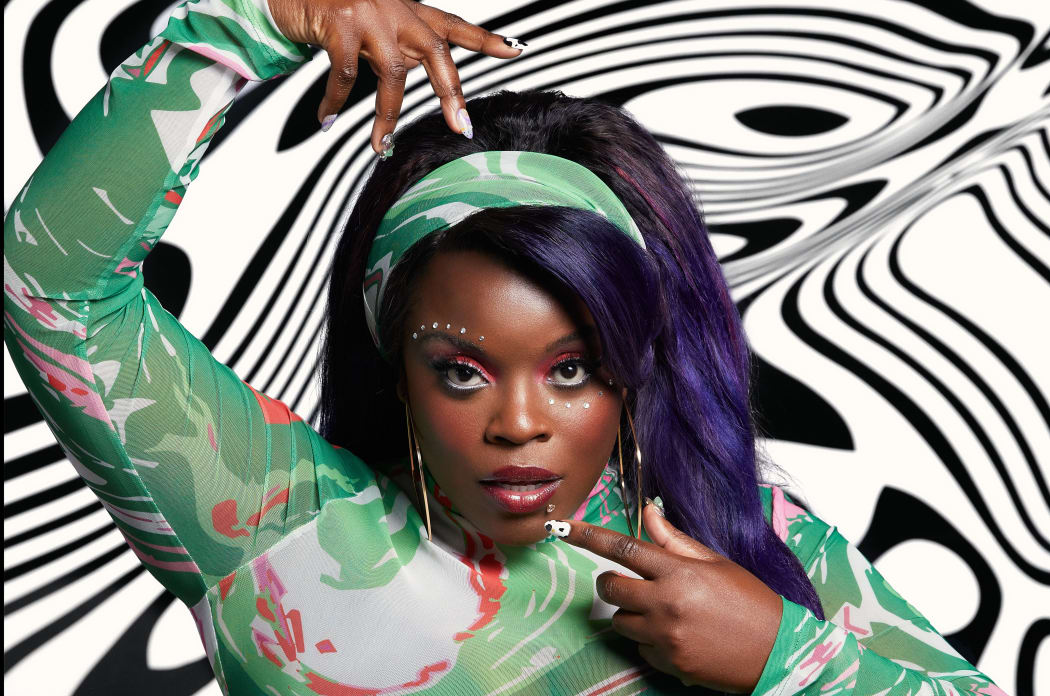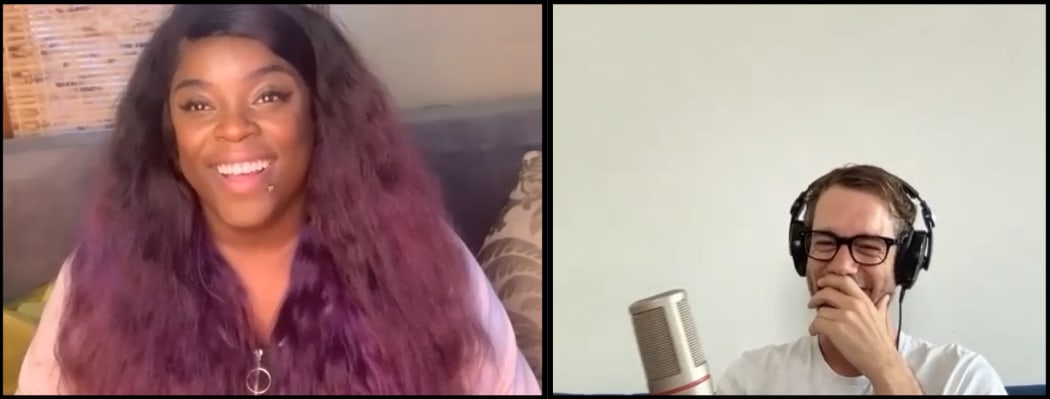Genre-fluid musician Yola discusses the myriad of musical and political underpinnings behind her Grammy-nominated album Stand For Myself.

Yola Photo: supplied
Even talking via a laptop screen, Yola's force of personality is massive.
She commands your attention, and not just that, makes sure you know you have hers, too.
Musicians often turn on the charm for the press, of course, but here it feels unforced and infectious, and our conversation is punctuated by her distinctive laugh, which is often provoked by her own jokes.
She's frequently very funny.
There’s reason for the good cheer - Yola is enjoying a run of accolades for her new album Stand For Myself, which garnered nominations for Best Americana Album and Best American Roots Song at this year's Grammy Awards (her first, Walk Through Fire, got four).
The titles of those nominations feel curious while talking to her - she's very British - but Yola’s music exists beyond borders, dipping into whatever genre takes her fancy.
Her music encompasses soul, disco, country and plenty more, in fact her Instagram bio describes her as 'genre-fluid'.
I ask whether this approach has ever hindered her in the often-siloed music industry.
"Early in my career, I would be told that I had no place in rock n' roll, or genres full stop.
"I tell this to Americans and they can't believe I'm even saying these words. I would literally walk into jazz and blues festivals that had no Black people in them. Like at all. Jazz!"
The pauses between those last three sentences are delivered with perfect comic timing, undercutting her very serious point, and I can't help but crack up. I immediately apologise, but she isn't phased.

Yola cracking up Tony during their Zoom chat Photo: Tony Stamp
"You have to laugh! They'll have one token Black person, and a sea of white people, and I'm like 'Hey, I know white people can do anything, you should be proud of yourselves, but come on!'
"So it wasn't pushback against certain genres I chose to explore, it was more pushback against me being a dark-skinned Black woman at all. It was that idea of 'Why do you want to do anything that isn't in service to somebody else?'.
"The times that people don't realise that their cognitive bias is being triggered, and they're starting to act it out, is in those moments. That was something I had to rail against the entirety of my career.
"People would write about me, and they'd assume that I'd been a backing singer, just because I was dark".
She gestures upward. "I know I'm being blasted by these lights right now, but I am in the threes and fours on Fenty [foundation shades], I'm telling you.
"My whole mission has been finding the root to my voice. Some of that has been getting away from people who didn't want me to win under my own steam".
Yolanda Claire Quartey was born in Bristol and has worked with a roster of notable UK acts, but it wasn't till a trip to Nashville in 2018 that her career really took off (she moved there permanently a year later).
Both her albums were produced by Dan Auerbach of The Black Keys at his Easy Eye studios, a collaboration she clearly enjoyed.
In the press materials I received prior to the interview, a few things are clarified: Yola was part of the writing team in Massive Attack, and their lead vocalist on tour (they asked her to join permanently but she declined).
Likewise, she wrote for UK acts Will Young and Chase and Status and was part of the production team for an unnamed Katy Perry song.
In all of these cases, her role was diminished to 'backup singer' in certain articles and interviews.
I suggest that getting to a place in her career where she can push back against being sidelined must be gratifying, but also exhausting.
"Yeah, but it highlights my point," she chuckles. "I wrote an album about striking out, about being a whole person and being seen, about everything from drawing boundaries, and how we're always divided in the ways that we are, to seeking out allyship.
"On the song 'Be My Friend' I talk about people not just seeing you as this trope of 'strong Black woman', this monolith that has no real character depth, no needs, no feelings. It's saying 'Do you see us?' If so then you might already be an ally!
"So weirdly, it helps reinforce the message on the record, of being whole. When you get to 'Stand For Myself' at the end of the album, I'm like 'I'm whole! I'm alive! I'm loved and I'm seen!'
"But people don't notice those little cogs going. It's programming. You're born, you don't know anything, and then systems put these ideas into your head. And so it's a choice to deprogramme'.
"Really this record is trying to trick you into empathy. It's like if you've ever had hypnotism they'll distract you with something, and then the words go into your subconscious. That's really what I was doing - groovy music, you're like 'Oh this is so dancey! It's so joyful! What's she saying? Ah never mind, it's so groovy!'
"Then you start reading: 'Oh she's saying that?!'"
I relay to Yola my own experience of hearing the album: first on a surface level, and then once I was aware of its structure - a sequential journey toward what she calls 'self-actualisation' - a much more serious one.
Titles like 'The Great Divide' became devastating (she punctuates me saying this with a loud 'A-haaa!'), and other ones like 'Diamond Studded Shoes' more intriguing.
There's a lyric in that one that goes 'They buy diamond-studded shoes with our taxes / Anything to keep us divided'.
When I ask her for further context I get an answer I wasn't expecting.
"Theresa May. You know her?"
I do.
"There was a Conservative Party conference that she hosted in some diamond-studded shoes - literally - going 'I'm sorry but we don't have any money.'
"I'm like, 'Don't we pay you?'
"She was known for having hundreds and hundreds of shoes. And I'm like 'You're a public servant, and you are flossing so hard'!
"That whole idea of excess, that you need your politicians to look a class apart from the rest of humanity, is buying into the idea of making the great divide between rich and poor even broader.
"And the idea of 'anything to keep us divided' is because they don't want us catching up to them. If we, collectively, have more spending power, then we have more actual power. And so it's that idea of making sure the gap is as broad as humanly possible, so they can live however they want to.
"We've all had bill anxiety, right? You know when you just don't want to open the post? And you think 'You know what, my life would be a lot better if I just put that on the pile with the rest of the unopened mail'.
"There are people who have no idea what that's like. And they're the people telling you that other people - who do know what it's like - want your money. It's like misdirection, making sure you never truly focus your energy on who the real enemy is".
The year ahead is a busy one for Yola, including a nationwide American tour, an appearance at Coachella festival, sold-out shows on her home turf of England, and an appearance in Baz Luhmann's Elvis biopic playing rock n' roll pioneer Sister Rosetta Tharpe.
Plus the Grammys are happening in April.
She tells me she's unsure if she (or anyone), will be able to attend, but hopes so.
Our goodbye is a lengthy one - she really doesn't do things by halves - and just before I go I promise to take the Harvard cognitive bias test she recently tweeted about.
Her face, which has been fixed in a grin for our entire thirty-minute conversation, somehow manages to beam even more.
Stand For Myself is available to stream or purchase now.

